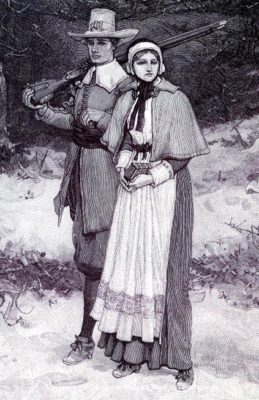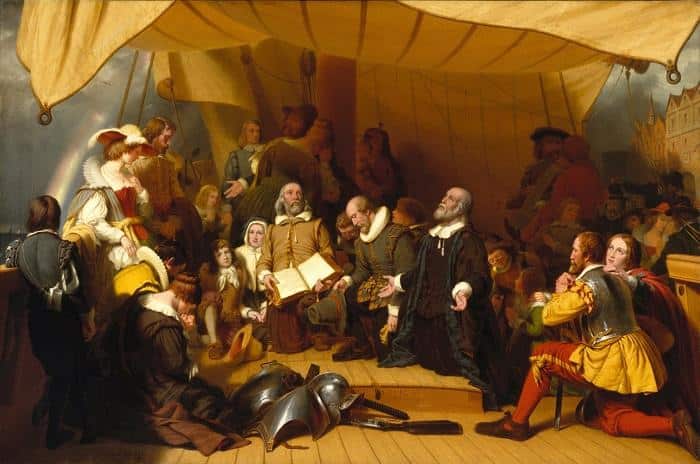“The conscious or unconscious relationship to God in
a man’s heart determines both man’s cultus and his culture.”
—Henry Van Til
What’s a Pilgrim?
The Pilgrim Fathers, like Thanksgiving itself, are quickly slipping down the collective memory hole of American materialism and self-indulgence. We no longer care that such a people lived, nor do we have any real conception of why they came to North America. Those who know something of the Pilgrims may speak vaguely of liberty or religious freedom. Many adult and children’s books say the Pilgrims came here “to worship God the way they pleased.” But this is a very big error — and a very serious one.
True Worship
The Second Commandment forbids us to recreate God after our imagination (Ex. 20:4-6). So that means … it also forbids us to imagine what might be pleasing to God. God represents Himself truly in His written Word. This written revelation tells us clearly and accurately how we ought to think about God and how we ought to worship Him. Real faith lies in submission to God’s Word … in worshipping and living in obedience to what God has said. All other sorts of worship are what Scripture calls “self-made religion” (Col. 2:23) and “the way of Cain” (Jude 11; cf. Gen. 4).
Now, the Pilgrims understood all of this. They had no desire to worship God as they pleased or as any other man … pope, prelate or king … pleased. They wanted to worship God according to His own self-revelation in Scripture. Their hearts were captive to the Word of God. They searched and studied the Bible to see what God had actually said about the matter, and they rejected all that seemed to them to be merely human tradition.
The Pilgrim’s flight to the New World was powered by this mindset. They fled an Old World of religious oppression and sought out a New World where they could obey Scripture in all matters of worship and life. And, yes, they hoped to be a steppingstone for other evangelical Christians who might follow. And yes, they hoped to play a role in evangelizing the native inhabitants of North America. But the one thing they didn’t want was to lay the foundations of a nation where everyone could worship God however he might please.
The Mayflower Compact
The Pilgrims themselves set out in writing their purposes in coming to North America. They drafted and signed a covenant document that created a civil commonwealth. That document is called The Mayflower Compact.
In the name of God, Amen. We, whose names are underwritten, the loyal subjects of our dread Sovereign Lord King James, by the Grace of God, of Great Britain, France, and Ireland, King, defender of the Faith, etc.

Having undertaken, for the Glory of God, and advancements of the Christian faith and honor of our King and Country, a voyage to plant the first colony in the Northern parts of Virginia, do by these presents, solemnly and mutually, in the presence of God, and one another, covenant and combine ourselves together into a civil body politic; for our better ordering, and preservation and furtherance of the ends aforesaid; and by virtue hereof to enact, constitute, and frame, such just and equal laws, ordinances, acts, constitutions, and offices, from time to time, as shall be thought most meet and convenient for the general good of the colony; unto which we promise all due submission and obedience.
In witness whereof we have hereunto subscribed our names at Cape Cod the 11th of November, in the year of the reign of our Sovereign Lord King James, of England, France, and Ireland, the eighteenth, and of Scotland the fifty-fourth, 1620.
The Pilgrim Fathers spoke plainly of the “glory of God” and the “advancements of the Christian faith.” Any laws, ordinances, acts or constitutions they or their descendants might later enact or create were to be for the furtherance of these ends. In short, the Pilgrims saw their colony as an outpost of the Kingdom of God and the Church of Jesus Christ. The liberty they sought and established was the freedom to obey God in all things, beginning with worship. It wasn’t a liberty for idolatry and “will worship” (Col. 2:23).
Freedom from Religion?
Today, America is schizophrenic on the matter of worship. We say that every man ought to be free to worship as he pleases. Most Americans believe that no one, (not even God), should offer a word of rebuke or correction in such matters. On the other hand, we insist that no one ought to carry his beliefs about worship out of his prayer closet or church into the public square. After all, liberty has its limits. Freedom of worship must remain a strictly private affair lest we offend someone or their pets.
Islam is the odd exception to this paradigm. Muslims, we are told, have the right to carry their worship into the public square, into schools, and even into the legal system. We are also told their religion is kind and peaceful and that it would be unloving, impolite and impolitic to say otherwise. Christians, especially those who stand in the tradition of the Pilgrims, are allowed no such “freedom.” Schizophrenia dial set at 11.
The Nature of Worship
Worship belongs at the center of human life because it’s here that humans meet their Maker. Christian worship is a matter of the heart, not of mere externals. But for this very reason, then … worship becomes the inevitably fountain of all law, social interaction and culture. For out of the heart are the issues of life; as a man thinks in his heart, so is he (Prov. 4:23; 23:7). Culture is our collective worship of God … externalized.
Godly worship promotes justice, mercy, love and peace within a society. Ungodly worship promotes hatred, bitterness, violence and war. The choice here seems easy enough. And yet true worship isn’t something that arises naturally in the human heart, nor is it something that one person can force on another. True worship, godly worship, can only arise from a heart renewed by the Holy Spirit through the Gospel. God seeks true worshipers through evangelism, the preaching of the Kingdom of God, and not through swords, guns or setting your city on fire.
But those freed by the Gospel will fight to maintain their freedom to worship God as His Word commands. They will lawfully and peacefully oppose those who try to destroy that freedom. They will speak the Gospel boldly, even if it leads to chains, torture, and death. That’s what the Pilgrims did.










